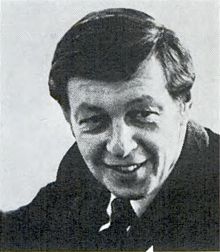This is an old revision of this page, as edited by Canadian Paul (talk | contribs) at 07:34, 20 November 2013 (Avoid statements that will date). The present address (URL) is a permanent link to this revision, which may differ significantly from the current revision.
Revision as of 07:34, 20 November 2013 by Canadian Paul (talk | contribs) (Avoid statements that will date)(diff) ← Previous revision | Latest revision (diff) | Newer revision → (diff)| Frederick William Richmond | |
|---|---|
 | |
| Member of the U.S. House of Representatives from New York's 14th district | |
| In office January 3, 1975 – August 25, 1982 | |
| Preceded by | John J. Rooney |
| Succeeded by | Guy V. Molinari |
| Personal details | |
| Born | (1923-11-15) November 15, 1923 (age 101) Boston, Massachusetts |
| Political party | Democratic Party |
| Alma mater | Boston University |
Frederick William Richmond (born November 15, 1923) is a former Democratic member of the United States House of Representatives from New York.
Richmond was born in Boston, Massachusetts. He served in the United States Navy from 1943 until 1945. Richmond graduated from Boston University in 1945. He served as deputy finance chairman of the Democratic National Committee from 1958 until 1960. Richmond was a delegate to the 1964 Democratic National Convention. He was a member of the New York City Council from 1973 until 1974. Richmond was elected to Congress in 1974 and represented New York's 14th congressional district from January 3, 1975, until August 25, 1982.
From the 1950s to the 1980s he built a conglomerate, incorporated in 1960 as Walco National, buying up and usually improving the operations of a diverse group of smaller operating companies. His business career was not without notoriety. Richmond was also known as an opportunist who skirted the ethics. In one instance, he was accused of involvement in greenmail, the purchase of strategic blocks of shares for resale back to a target for a profit.
In 1982 Richmond was convicted on federal corruption charges, which included possession of marijuana and payment of an illegal gratuity to a Brooklyn Navy Yard employee. As part of a plea bargain he was forced to resign from office. This was not Richmond's first brush with the law. Despite the seriousness of this crime Richmond referred to it as "an isolated incident" in his next re-election campaign. Soon after he was returned to Congress by a large majority of his constituents.
With a personal fortune estimated at $32 million, Richmond was one of the wealthiest members of Congress, He engaged in a wide array of civic and charitable activities in New York. In college, he supported himself by playing the piano and forming the Freddie Richmond Swing Band.
As of 2010 he was a resident of New York City.
External links
- United States Congress. "Fred Richmond (id: R000232)". Biographical Directory of the United States Congress. Retrieved on 2009-05-19.
- "What's Really Wrong with Fred Richmond?", Jim Sleeper, Village Voice, March 30, 1982.
| Political offices | ||
|---|---|---|
| Preceded byLeonard Scholnick | New York City Council, 18th District 1973 |
Succeeded byMorton Povman |
| Preceded byMario Merola | New York City Council, 29th District 1974 |
Succeeded byAbraham Gerges |
| U.S. House of Representatives | ||
| Preceded byJohn J. Rooney | Member of the U.S. House of Representatives from New York's 14th congressional district 1975–1982 |
Succeeded byGuy V. Molinari |
- 1923 births
- Living people
- People from Boston, Massachusetts
- United States Navy personnel
- American military personnel of World War II
- Boston University alumni
- New York Democrats
- New York City Council members
- Members of the United States House of Representatives from New York
- American politicians convicted of bribery
- People convicted of drug offenses
- American people convicted of tax crimes